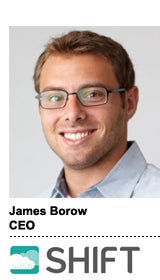 You can’t throw a 23-year-old media buyer without hitting a software “cloud.”
You can’t throw a 23-year-old media buyer without hitting a software “cloud.”
One of the precocious contenders in this bunch, social-centric SHIFT, has raised $6 million to support an expansion of its Open Marketing Cloud into Europe. The investment, led by DN Capital, brings its total financing to $14 million.
The company’s 29-year-old CEO, James Borow, wants SHIFT to be a flexible alternative to larger cloud competitors. He says the company has designed its platform with the thesis that auto, CPG and retail marketers have different needs and “clouds” must support unique combinations of available marketing tools. This is something Borow claims bigger rivals like Adobe, Salesforce and Oracle don’t do well.
“We view ourselves as being the biggest little guy in in that group,” Borow said.
SHIFT’s “cloud” is designed to look and feel like a social network. Its users can install applications – many of them focused on social marketing. These include Curalate (Pinterest and Instagram analytics), Expion (social management), Moontoast (social ad creation) and Optimal Analytics (Facebook advertising and analytics).
SHIFT also has data-management apps on its platform to let customers use first- and third-party data outside the social sphere. On this list are Aggregate Knowledge (data management platform), The Trade Desk (demand-side platform), Epsilon, Datalogix and email providers like MailChimp and Constant Contact.
Two apps — Media Manager and Media Analyzer — are offered directly by SHIFT. Media Manager, formerly known as GraphEffect, is an ad-buying product accepted by Facebook, Twitter and LinkedIn. It is SHIFT’s original business and generates media revenues for the company. It’s unclear how much of SHIFT’s revenue can be chalked up to Media Manager, but Borow says it’s “only one application on the cloud.”
SHIFT has recruited heavily from Facebook’s ranks, and from demand-side platforms (DSPs) and ad-tech companies. Its recently hired president, Paul Ollinger, is one of three senior execs Shift has recruited from Facebook. Another is Adam Gerston, who was a manager of Facebook’s Preferred Marketing Developer program and now runs SHIFT’s partner program.
SHIFT’s bias toward social applications is something it shares with Salesforce Marketing Cloud, which was built in part with components acquired through Buddy Media and Radian6.
“As social moves into new areas, we think it effectively just becomes ‘marketing.’ Instead of trying to solve the problems that exist outside of social, our thesis is that social will solve those problems,” Borow said. He cited Twitter’s acquisition of MoPub as an example of a social identity provider trying to address mobile display.
SHIFT has seen 300% revenue growth in the past year and is profitable today. However, profitability will not continue as it invests. The company opened its first office in London two months ago, and will continue hiring developers.
Facebook still draws the greatest ad demand through SHIFT’s platform. Borow said Twitter is growing fast, but is not yet taking budget from Facebook. Rather, the money is coming from search budgets, he believes. (Traditional online display budgets moved previously with shifts in user behavior.) TV dollars are not migrating, but social has become a complement to television.
“Two years from now, my hope is that TV targeting or targeting based on some other offline action is the norm across all these networks,” Borow said.











